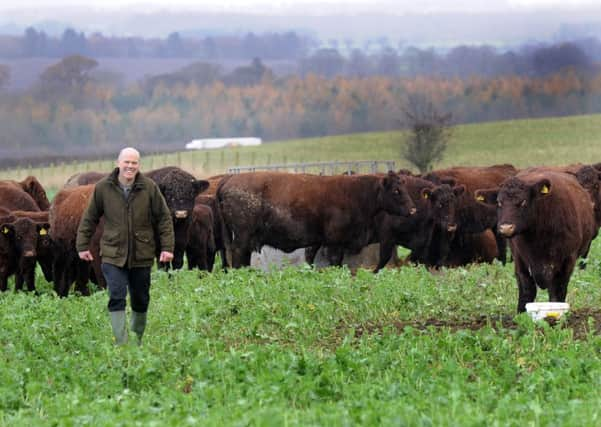Dairy to beef has made great business sense


Earlier this year I paid a visit to Dean and Angela Hullah’s Tancred Farm and Farm Shop at Whixley near the village of Green Hammerton, North Yorkshire, where their Lincoln Red beef has become extremely popular but a little further north is Richard Pearson’s Appleton herd, based at Manor House Farm in the hamlet of East Appleton near Catterick, just west of the A1.
Richard currently has 30 pedigree Lincoln Red cows as well as a commercial suckler herd of some 60 Belgian Blue X Limousins on the 100-acre owned farm. He rents another 160 acres. He started with the UK’s largest framed native breed almost a decade ago - in 2005 - just a year before coming out of the dairy farming industry.
Advertisement
Hide AdAdvertisement
Hide Ad“We chose the breed because of its docility. They are so easy to manage and thrive on grass. They are also extremely hardy and quite hairy.”
It took some research to settle on the breed but the family was in no doubt that it ticked all of their boxes.
“We had scoured local shows, visited other Lincoln Red breeders and as a family we had all liked them.
“We started selling boxed beef with help from the Growing Routes scheme which was run by the Yorkshire Agricultural Society using the herd prefix Appleton Beef and that has been quite successful.”
Advertisement
Hide AdAdvertisement
Hide AdAnd business has boomed with a list of customers located all around the country; the secret to their success being the diet the herd is fed on, Richard said.
“We now have customers as far afield as London and one lady has told us that she has never tasted anything better. That’s because they are fed pretty much wholly on grass and stubble turnips, which I feel is the best way; and the marbling in the beef is just right. We also sell stock through Northallerton Market.
“We keep the Lincoln Reds out until just before Christmas on 30 acres of stubble turnips and they are then in the shed until they calve in April and May. The land here is grade two light and stony which is relatively free draining although this last week’s weather changed things rather quickly.
“We’re due a change of our pedigree bull as we have had Beverley Nature, otherwise known as ‘Neddy’, for the past three years now.”
Advertisement
Hide AdAdvertisement
Hide AdRichard’s grandfather Osmund Pearson came to Manor House Farm as a tenant farmer in 1920 after returning from service in the First World War. Richard’s father John took over the farm before handing the reins to Richard when he retired in 1990.
“I can recall when we had 30 dairy cows in the byre and that was a big herd. We also had sheep and pigs. I can also remember us using milk churns. When we came out of dairying in 2006 we had 90 milking cows. I am one of those who still misses his dairy herd but maybe not the 24/7 that goes with it.
“We were offered the opportunity to buy the 100 acres that my family has rented since my granddad came here and the sale of the dairy herd helped us afford that. I’m now looking at increasing the size of our overall herd from 90 to around 120 cows in the next couple of years.”
The anticipated increase is fuelled by Richard and his wife Rachel’s son George and daughter Eleanor who are both interested in the farm and its future.
Advertisement
Hide AdAdvertisement
Hide Ad“George is in the third year of his apprenticeship with Russell Farm Machinery. He would love to be here full-time and given the choice he’d be here tomorrow but it’s important he gets other skills.
“Ellie is currently studying for her A-levels at Richmond School. They’re both keen Catterick YFC members and share my interest in livestock. Rachel works full-time for the MoD on the commercial side at Catterick Garrison. I’ve joked before now that she works half my hours for twice my wage!”
The only blight on Richard’s Lincoln Red pedigree herd is a frustrating and many believe highly unnecessary Bovine TB area status that came about in 2013. It is a unique 3km area that includes Manor House Farm. Richard says the status was designated when a neighbouring farmer brought deer from an infected area. Richard is concerned but determined not to be downcast.
“It limits my options as potential buyers of our breeding stock are understandably put off when they hear about us being in a TB zone but hopefully that won’t be for very much longer. In the meantime even more people will hopefully find out just how good our Lincoln Red Appleton Beef is and we can sell very well that way.”
Advertisement
Hide AdAdvertisement
Hide AdRichard is used to taking hard knocks. He played centre for Wensleydale RUFC for many years and is presently coaching the first team.
If you’d like to try Lincoln Red Appleton Beef, email him on [email protected]